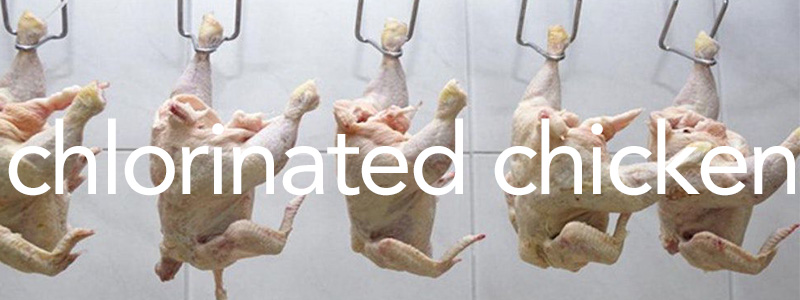Almost all European countries have banned the import of chlorinated chicken despite the argument by the United States that the practice of washing chicken with chlorine is completely safe
There have been serious concerns that the UK might eventually accept the import of chlorinated chicken in a bid to strengthen a trade deal between the country and the United States.
While the UK has maintained that the act of rinsing chicken with chlorine negates its standards on imported meat, the country might be pressured to lower its standards because of the Brexit trade deal it entered with the United States.
The attitude of the UK government by trying to vote down the country's standards on all imported foods is actually what is fueling these concerns.
The most commonly asked question is why the United States continues to see the chlorination of chicken as a safe practice while the UK doesn't see it that way? To get the answer to this, it is important to first know what chlorinated chicken means.
What is chlorinated chicken?
Chlorinated chicken is what is gotten when poultry meat has been rinsed with chlorine. The washing of chicken with chlorine has been seen as a safe practice in order to protect consumers against food-borne diseases. It is believed chlorinated chicken no longer contains harmful bacteria. This practice is very common in the United States; hence they often call it Pathogen Reduction Treatments.
This process ensures that the carcass of any slaughtered chicken is washed with chemicals and water so that all harmful bacteria can be removed.
Why is the consumption of chlorinated chicken allowed in the US?
The United States allows its citizen to consume chlorinated chicken because they believe it is the best way to prevent them from harmful bacteria like campylobacter and salmonella which are commonly found in slaughtered chicken.
A study was carried out to determine the effectiveness of Pathogen Reduction Treatments (PRTs) for the reduction of these harmful bacteria. The study showed that PRTs can help reduce the presence of Salmonella to about 2%, while the type of chicken eaten in the UK usually contains about 15-20% salmonella.
Why are PRTs banned in Europe?
Over the years, the trade deals between the UK and the United States have suffered in some ways. And that is because of the import policies of the European Union which forbid its member States from importing chlorine-treated chicken from the US and other parts of the world.
The EU doesn't support the use of PRTs because they believe doing so will keep lowering animal welfare conditions. The EU has always argued that the treatment of slaughtered chicken with chlorine would not have been an option if higher welfare standards were maintained right from the beginning of the production chain till the end.
For instance, the UK uses a "farm to fork approach, and the country believes this alone is capable of keeping animals in a perfect condition for human consumption. So instead of them using the chlorine treatments, they decontaminate slaughtered chicken using water and cold air.
Is it safe to eat chlorinated chicken?
The United States has always maintained that chlorinated chicken consumption doesn't pose any health challenges to consumers; as such, it is safe for human consumption. While this process usually requires the use of chorine, other substances that can be used are trisodium phosphate, peroxyacids, and acidified sodium chlorite.
Although the UK does not have anything against the use of chlorine for the decontamination of poultry carcasses, the country is only arguing that such practices will continue to lower animal welfare conditions. For instance, poultry farmers might decide not to provide proper welfare conditions for their chickens since they can use the simple process of PRTs to decontaminate poultry meat.
According to Monica Goyens, a member of The European Consumer Organisation: Essentially, what we are concerned about is not just the chemical itself, but rather the risk that these treatments will be seen as the easy fix to clean up dirty meat. Let's be clear.. no chemical rinse will ever remove all bacteria from meat heavily contaminated as a result of poor hygiene.
The above explanation describes the position of the UK, and it is clear that it is safe to eat chlorinated chicken.
Will the UK benefit more if the country stops obeying the EU rules on chlorinated chicken?
The UK will benefit more should the country eventually review its policies on chlorinated chicken.
According to the Adam Smith Institute, it highlights the various benefits the UK will gain in its paper titled Chlorinated chicken - Why You Shouldn't Give A Cluck.
It says if the government decides to scrap its policies on chlorinated chicken, British consumers should expect a slash in the price of poultry meat.
Are there indications that the UK poultry sector will accept this?
Judging from the positions of the various stakeholders in this sector, particularly the British Poultry Council, it doesn't look like they are in total support of it.
The British Poultry Council believes they are very capable of meeting the needs of the UK population as far as poultry meat is concerned. This is a statement that shows these people will resist the UK government if it decides to go ahead with the import of chlorinated chicken.
As it stands now, the UK government has reaffirmed that the country is not relaxing its standards on food products coming from outside the UK. With this, the government is saying it will continue to maintain its stands on chlorinated chicken. This was contained in the letter jointly delivered by international trade secretary Liz Truss and Environment secretary George Eustice to MPs.
However, the United States is doing everything in its capacity to talk the UK into accepting to scrap its policies on chlorinated chicken. Whichever way this turns out, the position of the UK will affect the country in their post-Brexit trade negotiations with the United States.
